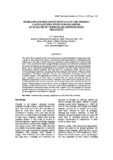Problems and mis conceptions facing the primary language education in Bangladesh: an analysis of curricular and pedagogic practices
Abstract
This article offers a portrayal of the issues and concerns usually being ignored or bypassed to either a greater or lesser extent in the literacy curriculum and instructional practices in Bangladesh at the primary level. The study is broadly based on a naturalistic inquiry method over a period of four years. Views presented here have emerged through a passionate and exhaustive involvement with the design, development and dissemination phases of an intensive language education development project and its subsequent mainstreaming in an alternative education system dedicated for the disadvantaged children-community. My work there has encompassed setting curricular goals, selecting pedagogic approaches, designing instructional strategies and materials, setting assessment arrangements, developing follow-up indicators, and formulating monitoring, research and evaluation demands. This opportunity has enabled me to develop a deep understanding, coupled with a pragmatic view of what aspects are absent from the current educational practice in Bangladesh, particularly in respect to literacy. Numerous issues, both in policy and practice, need to be addressed with more focus to increase the rate of change towards more effective outcomes for learners. Putting emphasis on mechanistic aspects of language learning, bias towards dominant identity in content selection process, a pervasive content-driven pedagogy and assessment practice, disproportionate instructional priority on lower order cognitive skills and mismatch of curricular intention with teacher-training curricula are some areas where problems prevail. Possible strategies are been suggested to overcome these challenges

